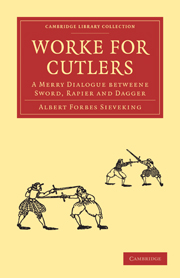INTRODUCTORY NOTE
Published online by Cambridge University Press: 07 September 2010
Summary
Mr Forbes Sieveking's valuable contribution to a field of literary research which notwithstanding its many attractions still remains relatively neglected needs, I am sure, no commendation on my part. To begin with, this scholarly edition, alike instructive and suggestive, of a very curious and very creditable specimen—shall I say of University wit or of wit suitable for University consumption?—will be welcomed by many Cambridge readers as a pleasant reminiscence. Last summer, the performance of Worke for Cutlers, when Sword, Rapier and Dagger carried on their subtle contention in the open, set the crown upon the pleasant hospitalities of a Long Vacation afternoon spent in the congenial surroundings of Trinity Hall. And, remembering how near we were to Clare and Trinity and St John's, some of us could not on the occasion repress the wish that in these days, when there is so much theatre of one kind or another, ‘shews’ bringing to mind the polite recreations of our predecessors were more frequent; and that the revival in loco of this ‘merry dialogue’ might lead to the reproduction of some full-blown specimens of a far from insignificant literary growth-our native academical drama. Worke for Cutlers dates from a period in our University history signally memorable in respect of its efforts in this direction; for it was printed in the very year of the famous royal visit to Cambridge, during which among other plays Ignoramus and Albumazar were performed; and, when one comes to think of it, Oliver Cromwell, who is fabled to have filled a part in a much earlier academical comedy, only came up a year or so too late to have a chance of playing Sword.
- Type
- Chapter
- Information
- Worke for CutlersA Merry Dialogue betweene Sword, Rapier and Dagger, pp. 11 - 14Publisher: Cambridge University PressPrint publication year: 2009First published in: 1904



